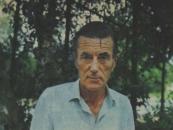William Hart-Smith was born in England and moved with his parents to Auckland, New Zealand, in 1924. In 1936 he moved to Australia, living in Sydney, Hobart, Western Australia and Darwin and serving in the A.I.F.between 1942-1943. He returned to New Zealand in 1946, but moved back to Sydney in 1962 working as an advertising manager, then a radio technician.
From 1963-64 he was president of the Poetry Society of Australia. In 1970 he moved to Perth and taught creative writing at the Western Australia University of Technology (Curtin University). In 1978 he moved back to Auckland and lived there for the rest of his life.
Hart-Smith was heavily influenced by Ezra Pound, D. H. Lawrence and the Imagist movement. While in Tasmania in 1936, he developed an interest in Aboriginal myth. This led to his association with the Jindyworobak Movement, an association that saw his poems published regularly in Jindyworobak anthologies during the 1940s.
He published several volumes during the 1940s, most notably Christopher Columbus (1948). Hart-Smith's reputation continued to grow with subsequent publications and his poetry attracted a number of awards.
Recognized as both an Australian and New Zealand poet, Hart-Smith died in 1990. Hand to Hand: A Garnering, a collection of his published and unpublished poetry, was compiled in 1991 and includes a selection of essays on his life and work.
A number of his poems were set to music in the 1990s by Stephen Leek and others.
 8154451844485428618.jpg
8154451844485428618.jpg
 8154451844485428618.jpg
8154451844485428618.jpg